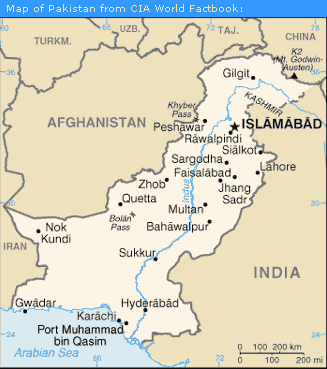Pakistan achieved independence in the 1947 partition of the Indian subcontinent, and has since fought two wars (1947-48 and 1965) with India over the still-disputed land of Kashmir. Conflict with India remains a defining aspect of Pakistani politics, causing both countries to pursue, and then attain, nuclear-weapons programs in recent years. Tensions were so high in 2002 that many feared the first-ever war between nuclear powers. Yet relations have greatly improved, and Pakistan’s president has even spoken of a peaceful resolution by 2006. The president, General Pervez Musharraf, also runs the Pakistani military, a fact that some observers find disconcerting. Musharraf came to power in a bloodless coup in 1999, and a year later the Supreme Court (whose members are appointed by the president) validated the coup and granted him two more years as executive. In a 2002 referendum, widely considered to have been rigged, Musharraf won a five-year term. In late 2004, he went back on a promise to step down as military leader and rule only as a civilian. Yet Musharraf has not attracted as much criticism from the United States government as other autocrats in the region. Not only has he helped smooth tensions with India, he has professed democratic goals for Pakistan; Musharraf speaks of Pakistan’s need for “enlightened moderation,” which will reform the nation — but not so rapidly as to inspire reactionary violence by Islamic extremists, and not at the expense of cracking down on opponents who threaten the nation’s stability. (This concern is not without merit; Musharraf has survived at least two assassination attempts.) Pakistan shares a long border with Afghanistan, and has cooperated with the U.S. in pursuing Al Qaeda members since the attacks September 11, 2001. Though skeptics question the vigor with which the general’s troops pursue Osama bin Laden — and note that as long as bin Laden remains at large, Musharraf holds a trump card in dealing with the U.S. — he appears to have earned the trust of his American allies. Musharraf has not yet announced if he will seek another term in 2007, nor has he indicated whether he has any plans to relinquish his uniform. He faces many domestic and international challenges, is generally averse to flaunting his substantial powers, and has proved himself to be a savvy tactician. And for the foreseeable future, Pervez Musharraf will continue to determine the direction of politics in Pakistan.
- Previous: Oman
- Next: Palestinian Territory



